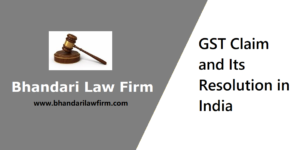Who May File Claim Under The Insolvency and Bankruptcy Code 2016 against the Corporate Debtor.
Claim Under Insolvency and Bankruptcy Code 2016: As per section 6 of the insolvency and bankruptcy code 2016, the following persons may initiate CIRP (Corporate Insolvency Resolution Process) against the corporate debtor on committing default in debt-
- A financial creditor,
- An operational creditor,
- A corporate applicant.
Who is the creditor?
Before going for discussion on the financial creditor, operational creditor, corporate applicant, and corporate debtor, we should know the definition of ‘creditor’ which is defined under section 3 (10) of the code as-“Creditor” means any person to whom a debt is owed and includes a financial creditor, an operational creditor, a secured creditor, an unsecured creditor, and a decree-holder. Claim Under Insolvency and Bankruptcy Code 2016
What is the claim?
Section 3 (11) defines the debt, means a liability or obligation in respect of a claim which is due from a person and includes a financial debt and operational debt and Section 3 (6) defines a claim as under:
“Claim” means-
(a) a right to payment, whether or not such right is reduced to judgment, fixed, disputed, undisputed, legal, equitable, secured or unsecured;
Also Read: National Company Law Tribunal
(b) right to remedy for breach of contract under any law for the nonce effective, if such breach gives rise to a right to payment, whether or not such right is reduced to judgment, fixed, matured, unmatured, disputed, undisputed, secured or unsecured. Claim Under Insolvency and Bankruptcy Code 2016
Who is a person?
The person defines under Section 3 (23) of the Code includes:
(a) an individual;
(b) a Hindu Undivided Family;
(c) a company;
(d) a trust;
(e) a partnership;
(f) a limited liability partnership; and
(g) any other entity established under a statute,
Financial Creditor Claim Under Insolvency and Bankruptcy Code 2016
The Financial creditor defines under section 5 (7) means any person to whom a financial debt is owed and includes a person to whom such debt has been legally assigned or transferred to.
Operational Creditor Claim Under Insolvency and Bankruptcy Code 2016
An operational creditor is a creditor whose claim arises out of a normal business transaction that such creditor may have had with the legal entity. It would include money receivable by an employee or a worker of the company as wages or salary. It would also include a claim of statutory authority on account of money receivable pursuant to an imposition by a statute. Operation creditors mean as per Section 5 (20) a person to whom an operational debt is owed and includes any person to whom such debt has been legally assigned or transferred.
Corporate Debtor Claim Under Insolvency and Bankruptcy Code 2016
As per Section 3(8), Corporate Debtor means a corporate person who owes a debt to any person.
Section 3 (7) defines the Corporate Person as under:
Click Here To Download THE INSOLVENCY AND BANKRUPTCY CODE, 2016
Corporate person means a company as defined in clause (20) of section 2 of the Companies Act, 2013, a limited liability partnership, as defined in clause (n) of sub-section (1) of section 2 of the Limited Liability Partnership Act, 2008, or any other person incorporated with limited liability under any law for the time being in force but shall not include any financial service provider.
Note: For any further information or any query you may contact us on 9855677966 or via email info@bhandarilawfirm.com



